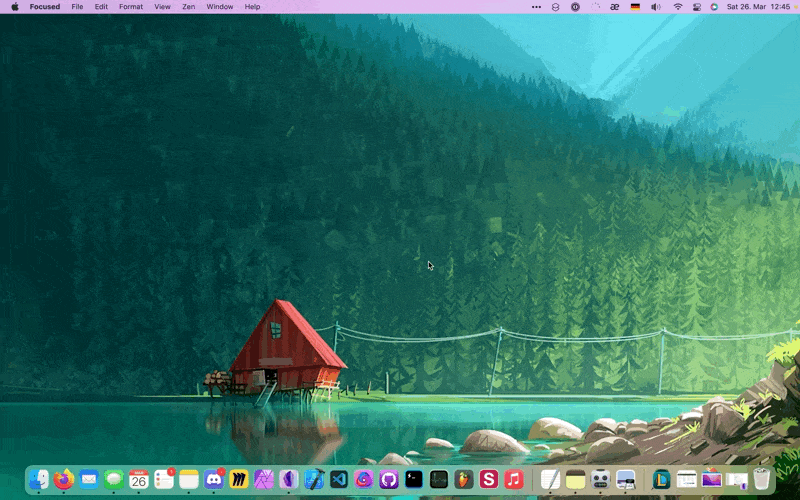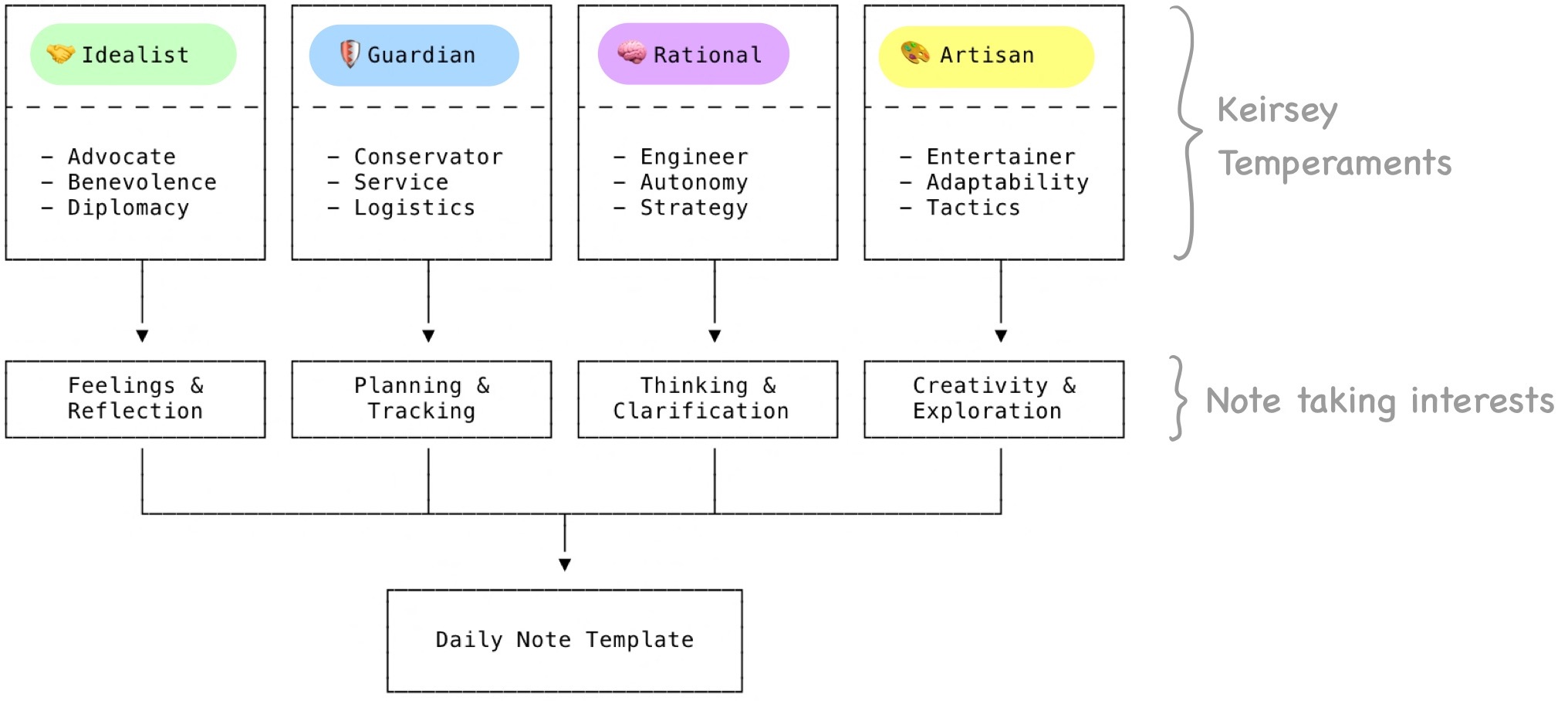🗒️ Why digital Daily Notes don’t work (for everyone)
Daily Note: A note, in which an individual keeps track of their thoughts, ideas, and experiences on a daily basis.
Daily Notes can be kept analogue or digital. Recently, with the advent of Personal Knowledge Management Systems (PKMS)1 such as RemNote2, Obsidian3 or Roam Research4, digital Daily Notes in particular have risen in popularity. Many of these digital tools for thought offer Daily Notes as a native feature, alongside their core functionality. Similar to keeping a diary, the practice of taking Daily Notes is said to help individuals reflect on their day, identify patterns and trends, and learn from their mistakes5. Combined with digital technology, this process must be a powerful tool – right?
Personal Experience
My personal experience with digital Daily Notes has been mixed. As an enthusiast for all kinds of productivity tools, digital ones in particular, I was naturally drawn towards them. Documenting my day, managing to-dos and logging ideas with the added benefit of gaining valuable insights seemed great. I attempted it several times, each time getting annoyed or bored after a few days of diligent daily note-taking. I really wanted to use them, but for me, the existing workflows and templates didn’t cut it. It felt like a gimmick or, even worse, like a waste of time. As it turned out, I was not alone with that sentiment. On Reddit and in community forums, I found other people who felt the same6. However, there was also a substantial number of people who, contrary to my experience, really liked taking Daily Notes7.
Problems & Solutions
So, where’s the problem? Why do digital Daily Notes not work for everyone? In my opinion, there are three major problems: two with digital Daily-Notes specifically and one with Daily-Notes in general.
- Digital Daily Notes specifically:
- Problem 1: Suboptimal technical implementation
- Problem 2: Limited feature set
- Daily Notes in general:
- Problem 3: Different Daily Note-taking needs
In the following paragraphs, I will outline these problems in more detail, as well as suggest solutions on how to fix them. At the end, I will showcase my current Daily-Note system, in which I implemented said solutions.
Problems of Digital Daily Notes
Problem 1: Suboptimal technical implementation
When taking Daily Notes, one can do so either in an analogue or digital manner. The analogue approach sets a high bar to beat: Simply pick a pen and paper, then start writing. It feels natural, private, and most importantly: it’s quick. No fiddling with a computer, no logging in, no waiting for a program to open. You can just start writing. Most digital implementations I’ve come across so far, simply try to emulate a physical notebook, without offering any game-changing features. Yes, searchability and templates save time, improved persistence offers peace of mind, and integration into your note-taking app of choice is nice. But where’s the innovation?
Daily Notes are taken multiple times throughout the day. Therefore, the process must be frictionless. For example, waiting two seconds for a note-taking app to open up isn’t a dealbreaker, it’s annoying. Yet, many small annoyances, happening multiple times a day, sum up and will cause death by a thousand cuts. One solution to this problem is faster app startup time. Unfortunately, that’s easier said than done since many popular tools for thought such as Obsidian or RemNote are built using Electron or other cross-platform toolkits, making it hard to reach native performance. Another solution would be to offer an input prompt, similar to Alfred8 or Spotlight9, that’s running as a daemon in the background. Users could quickly interact with the current Daily Note, by simply pressing a keyboard shortcut to insert text into it. Here’s a quick demo of my daily note Alfred workflow for logging thoughts, in which I implemented such a prompt:

Problem 2: Limited feature set
Daily Notes should offer unique insights. This is where digital tools could offer unique features, compared to analogue ones: Analyzing text written on paper has to be done manually, resulting in old Daily Notes turning into dusty piles of paper with no one bothering to read them. Digital Daily Notes, on the other hand, can be aggregated and analyzed seamlessly. However, this strength of the medium has not been fully realized by current solutions, either. While there are some applications, mainly digital diaries, which do a sentiment analysis based on the entry10, I have yet to see an app, which offers actually interesting insights from some sort of automatic analysis. What I found instead were simple statistics and “mood graphs”, a feature I found rather problematic: Why would I want my diary to tell me, how crappy my last few weeks have been, and that I’m on a downward trend? The only thing that’s going to do is push me towards writing happier diary entries so that I can cope with the situation. So, how can digital Daily Notes offer unique insights? I think it’s possible by expanding on the idea of using 🧠 Artificial Intelligence to analyze Daily Notes. For example, it could be used to suggest resources or generate custom questions based on previous notes, giving users the chance to expand on previous thoughts. Weekly summaries in the form of a written text or word clouds can give an overview over what one has been thinking about lately. Procedural ideation could help propose new ideas or find hidden connections between concepts one hasn’t thought about yet. The possibilities are endless. Imagination is great, but would this actually work in the real world? The field of NLP is broad, and many roads lead to Rome. But to test the idea, I used GPT-3, one of the most powerful language prediction tools, to generate some text. Although the input only consisted of a thought log from a single daily note, the results were impressive. Here are two examples I generated using the Open AI playground11:
![[1_gpt_gen.jpg|]] ![[2_gpt_gen.jpg|]]
Problems of Daily Notes in general
Problem 3: Different Daily Note-taking needs
People have different Daily Note-taking needs, which are mostly neglected. Most daily note-taking applications greeted me with a blank page, so the first thing I did was to go out and find a template that suited my needs. I tried out a few community templates12 from the vast catalog that is Reddit, but none of them stuck. I found out that daily notes can look extremely diverse. For example, they can be used for managing tasks, tracking thoughts, exploring feelings or writing about experiences one had during the day. However, daily notes are not a one size fits all solution. For example, some people simply aren’t concerned about logging their ideas or tasks, they just want to reflect on their feelings. This explains why there are so many templates out there, they need to be customized to the users’ personality. But how would one go about creating a personalized daily note template, when there are so many possible things one could write about on a blank note? Moreover, could it be done automatically? One possible solution could be to let users complete a personality test and utilize the results to generate a custom template, which satisfies the individual note-taking needs. What would these different note-taking needs look like, through the lens of a personality analysis? For illustration purposes, I am going to derive four basic note-taking needs from the Keirsey Temperament Sorter, which is one of the most widely used personality assessment in the world13. It is worth noting that there have been discussions over how scientific this indicator is compared to other ones such as The Big Five14. For this argument, however, I went with the Keirsey Temperament Sorter since it offers clear personality type categories, which are easy to identify with.
The Keirsey Temperament Sorter suggests four basic temperaments (i.e., personality type categories): Idealist, Guardian, Rational, Artisan. Taking these personality types as a baseline, one could now derive the following note-taking needs:

To satisfy those needs, here are some example elements, which a personalized daily note template could consist of:

Obviously, real people can’t be categorized into one of four categories, everyone lives on a spectrum. Therefore, having a template consist of elements stemming from different categories is also fine. However, most people will still feel drawn towards one or maybe two categories of daily note elements. To put it all together, here is an example template I created, which I found fits my needs (Rational temperament) quite well:

This template, in combination with the Alfred workflows, significantly improved my digital Daily Note-taking. The daily note-taking now helps me to discover new ideas as well as to clear up my thoughts. I value both of these benefits. If you wish to create your own personal Daily Note template, you can do a Keirsey Temperament Sorter test here. If you already know your MBTI15 personality type (e.g., if you did the 16Personalities test), you can check which temperament your personality type maps to using this infographic.
Thanks for reading, that’s all I have to share on this topic for now. If you wish to discuss this topic further, feel free to share this post or contact me.
Footnotes
-
“Personal Knowledge Management.” In Wikipedia, March 15, 2022. https://en.wikipedia.org/w/index.php?title=Personal_knowledge_management&oldid=1077218612. ↩
-
Hiemstra, R. (2001). Uses and benefits of journal writing. New Directions for Adult and Continuing Education, 2001(90), 19. https://doi.org/10.1002/ace.17 ↩
-
Slayonetta. “For Obsidian Users: Do You Guys Use the Daily Note Feature?” Reddit Post. R/Zettelkasten, August 31, 2020. www.reddit.com/r/Zettelkasten/comments/ijurz7/for_obsidian_users_do_you_guys_use_the_daily_note/. ↩
-
slow_cheetah_52. “How Do You Make Daily Notes Useful?” Reddit Post. R/ObsidianMD, October 15, 2021. www.reddit.com/r/ObsidianMD/comments/q8nj34/how_do_you_make_daily_notes_useful/. ↩
-
“Alfred - Productivity App for MacOS.” Accessed April 26, 2022. https://www.alfredapp.com/. ↩
-
“Spotlight (Software).” In Wikipedia, April 10, 2022. https://en.wikipedia.org/w/index.php?title=Spotlight_(software)&oldid=1082013202. ↩
-
Sharma, Preeti. Digital-Diary-Web-App, 2021. https://github.com/PreetiSharma2815/Digital-Diary-Web-App-With-Emotion-Sentiment-Analysis. ↩
-
“OpenAI API.” Accessed April 26, 2022. https://beta.openai.com. ↩
-
mrhobbeys. “Daily Note Templates - Please Share.” Reddit Post. R/ObsidianMD, September 7, 2021. www.reddit.com/r/ObsidianMD/comments/pjp8d1/daily_note_templates_please_share/. ↩
-
“Keirsey Temperament Sorter.” In Wikipedia, April 10, 2022. https://en.wikipedia.org/w/index.php?title=Keirsey_Temperament_Sorter&oldid=1081904449. ↩
-
“Big Five Personality Traits.” In Wikipedia, April 23, 2022. https://en.wikipedia.org/w/index.php?title=Big_Five_personality_traits&oldid=1084313351. ↩
-
“Myers–Briggs Type Indicator.” In Wikipedia, April 23, 2022. https://en.wikipedia.org/w/index.php?title=Myers%E2%80%93Briggs_Type_Indicator&oldid=1084194034. ↩